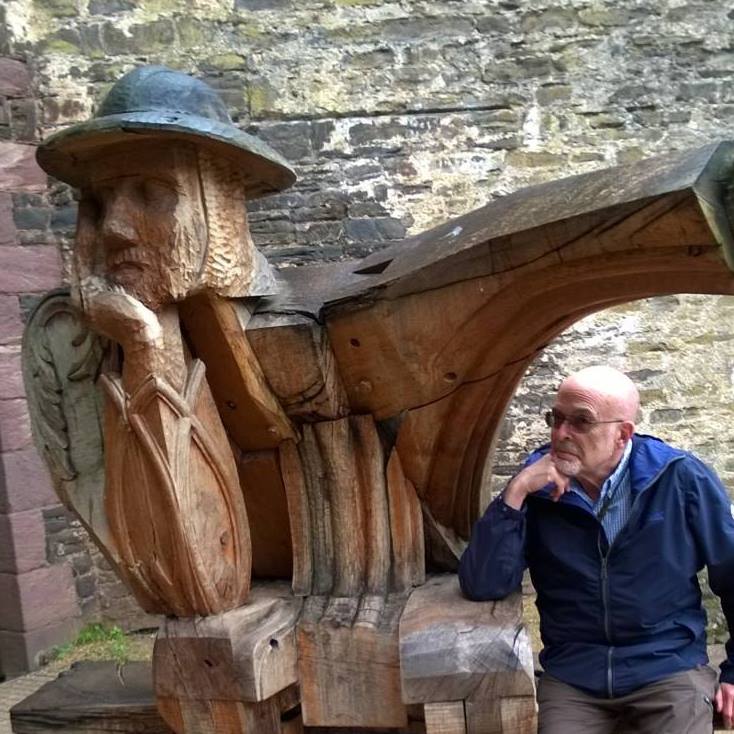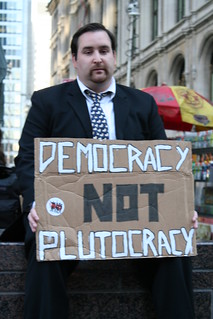Slightly more than a third of eligible voters bothered to cast a ballot in the Nov. 4 demonstration of the vitality of American democracy--the lowest turnout in 72 years. It was a big day for the GOP, which now has a majority in both Houses of Congress, as well as 31 governorships and control of more than two-thirds of state legislatures ( Washington Post , 11/11/14).
Corporate profits as a percentage of GDP are at a record high, while labor compensation is declining (New York Times, 04/05/14 ). The Obama "recovery" has mostly benefitted wealthy investors. In their October 2014 study of economic inequality, Saez and Zucman report that "the rise of the share of wealth owned by the 0.1% richest [160,000] families," rose "from 7% in 1978 to 22% in 2012." During this same period, the share of the nation's wealth owned by the bottom 90% (including the middle class) went from 33% to 23%.
Despite this soaring inequality, voters who bothered to vote favored the party that promised to further enrich wealthy investors by lowering their estate, income and capital gains taxes, and privatizing public assets such as schools, prisons and municipal water systems. Despite widespread job insecurity and stagnant wages, despite the fact that 1 in 5 children live in poverty and 2.5 million were homeless for some time in 2013, millions of Americans voted for a party that salivates at the prospect of gutting the programs making up the social safety net.
Distraught liberals blame the Democratic defeat on such things as voter ignorance and the shrill propaganda of Fox News. No doubt these played a role, but something deeper is at work--an inarticulate despair about the political process itself. As an anti-government party, the GOP exploits this despair.
The political process has been so thoroughly captured by a wealthy investor class that a growing portion of the bottom 90% see little reason to expect anything good from it, no matter which party wins an election. Wages stagnate, wealth inequality keeps growing, higher education becomes more inaccessible, health care continues to be twice as expensive as in other developed countries and Wall Street bankers don't go to jail for their crimes no matter which party controls Congress or wins the presidency.
Before any citizen gets to vote for a candidate for state-wide office, for Congress or for President, that candidate must be approved by a small minority who have enough money to make a campaign financially possible. These are the .1% whose wealth has tripled since 1978.
One of the very best sources of information on the role of the super-rich in deciding who gets to run for office is the website of the Sunlight Foundation . It has sponsored several studies on the electoral power of what it calls the "1% of the 1%." In the 2012 cycle, this group consisted of 31,385 individuals who contributed a total of $1.68 billion--28% of the $6 billion from identifiable sources in 2012. (These individuals will come almost entirely from the .1% of richest families discussed by Saez and Zucman above.)
The smallest contribution from this group was $12,950; the median was $26,584. Compare those numbers to what OpenSecrets . org , tells us about small donors in the 2014 cycle: 99.72% of the adult U.S. population contributed less than $200. We could call these people the "nearly-everyones." In 2012 Obama got 28% of his campaign funds from these small donors, while Romney got only 12%.
If you, the individual, belong to the "nearly-everyones," you're a nobody in the calculations of a presidential or congressional campaign. If democracy is one person--one vote, and plutocracy is one dollar--one vote, we're way into the plutocratic part of the spectrum.
The American ruling class will let us debate social issues like abortion and same-sex marriage. Since Obama has put the wasteful for-profit health industry at the heart of Obamacare, the investor class is ok with us being for or against this law. But the super-rich and corporate media do not want a serious debate about economic inequality.
They want to keep individual and corporate taxes low, so they favor cutting the cost of government programs that are part of a social safety net they will never need. Unlike most Americans, they don't see job creation as a national priority because low unemployment threatens to raise labor costs. It would shift money and power from capital to labor and might even resurrect the union movement.
In America's managed democracy, the super rich are, as the Sunlight Foundation puts it , "the gatekeepers of public office in America." Because congressional and presidential candidates can't run without their money, '"they increasingly set the boundaries and limits of American political discourse -- who can run for office, what their priorities should be and even what can be said in public."






